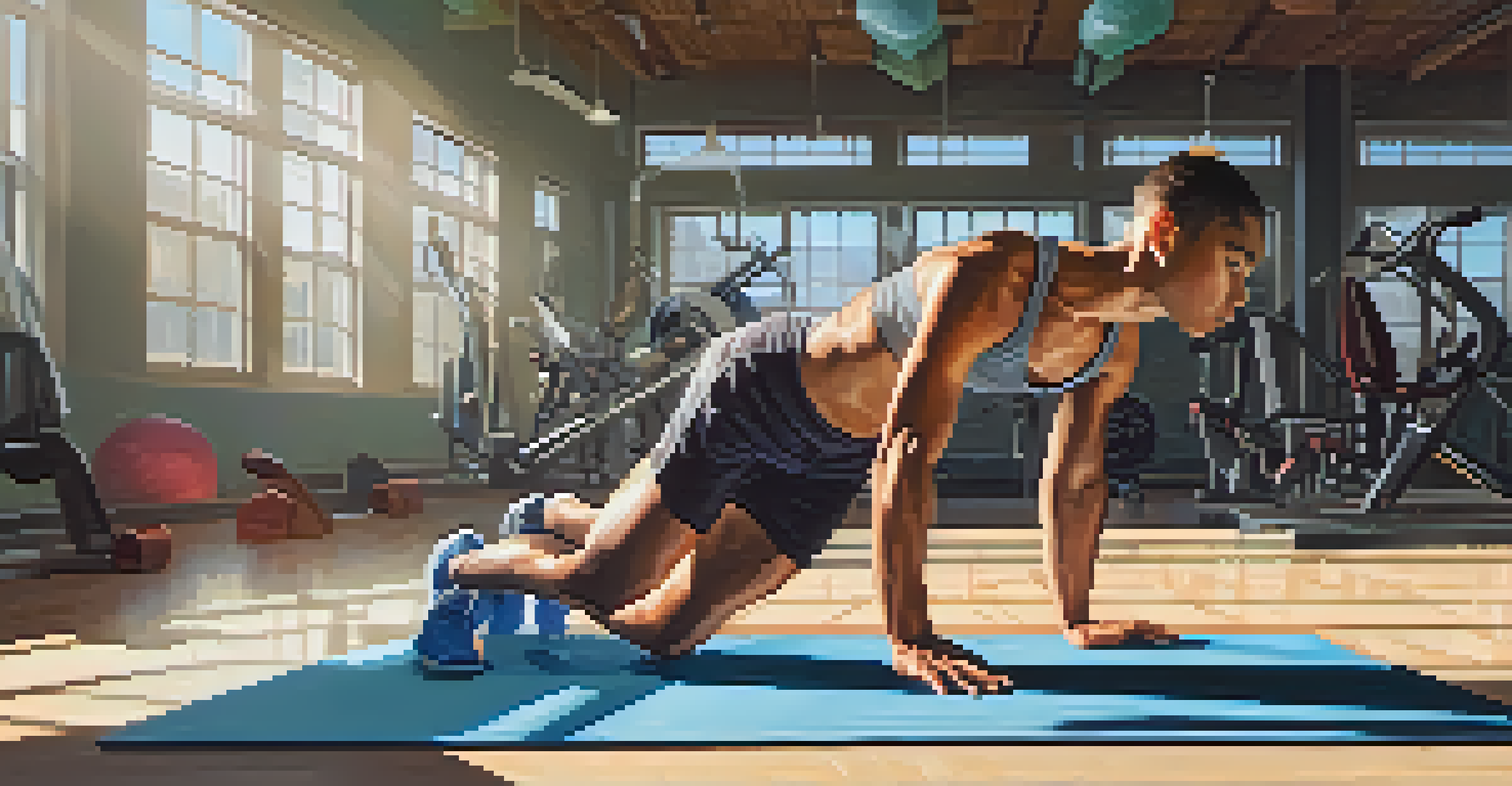The Importance of Warm-ups in Reducing Performance Anxiety

Understanding Performance Anxiety and Its Impact
Performance anxiety can be a significant hurdle for many individuals, whether they are athletes, musicians, or public speakers. This type of anxiety manifests as nervousness or fear before a performance, leading to decreased confidence and subpar execution. It's important to recognize that these feelings are common and can affect anyone, regardless of their experience or skill level.
Anxiety is the handmaiden of creativity.
When anxiety kicks in, it can create a mental block that inhibits focus and clarity. For instance, a musician might find their fingers stiffening up, making it difficult to play their instrument. Similarly, an athlete may struggle to recall their training or techniques, resulting in a lack of performance. Understanding the effects of performance anxiety is the first step toward managing it effectively.
Fortunately, there are strategies to combat performance anxiety, one of which is a proper warm-up routine. By addressing both the physical and mental aspects of preparation, individuals can set themselves up for success and reduce the impact of anxiety on their performance.
The Role of Warm-ups in Mental Preparation
Warm-ups aren't just about preparing the body; they also play a crucial role in mental readiness. Engaging in a warm-up can help shift focus from anxious thoughts to the task at hand, creating a more positive mindset. For example, a singer might use vocal exercises to not only warm up their voice but also ground themselves in the rhythm and melody they will perform.

This mental preparation is akin to athletes visualizing their performance before a game. By picturing themselves succeeding, they can boost their confidence and diminish feelings of anxiety. Warm-ups create a space for this visualization, allowing performers to mentally rehearse and feel more in control.
Warm-ups Reduce Performance Anxiety
Engaging in warm-up routines can significantly alleviate performance anxiety by preparing both the mind and body.
Additionally, a structured warm-up routine can provide a sense of familiarity and comfort. When individuals know what to expect in their warm-up, it can reduce uncertainty and further alleviate anxiety, making them feel more prepared as they approach their performance.
Physical Benefits of Warm-ups for Anxiety Reduction
Engaging in physical warm-ups increases blood flow to the muscles and enhances overall physical readiness. This boost in circulation can lead to a release of endorphins, which are natural mood lifters. As the body becomes more engaged, the mind often follows suit, leading to reduced tension and anxiety.
The only thing we have to fear is fear itself.
Moreover, physical activity during warm-ups can help release built-up nervous energy. Think of it like shaking out a bottle of soda: when you let out that pressure through movement, it helps you feel lighter and more focused. This release can significantly lower anxiety levels and prepare the body for the demands of performance.
Incorporating stretches and mobility exercises into a warm-up routine not only prepares the body but also promotes relaxation. By physically relaxing the muscles, performers can mentally ease their worries, creating a more balanced state for optimal performance.
Establishing a Consistent Warm-up Routine
Consistency is key when it comes to warm-ups and anxiety reduction. By establishing a routine, individuals can create a sense of predictability that can ease nerves. Think of it like a ritual: just as athletes have pre-game rituals, performers can develop warm-up routines that signal their brains it’s time to focus.
A consistent warm-up routine helps condition the body and mind to respond more effectively to performance situations. Over time, the brain associates these warm-up activities with readiness and success, reducing the likelihood of anxiety. It’s this repeated practice that builds confidence and familiarity.
Breathing Techniques Enhance Focus
Incorporating breathing techniques into warm-ups helps performers center their thoughts and reduce nervousness.
Finding the right routine may take some experimentation, but once established, it can become a powerful tool in managing performance anxiety. Whether it's a few minutes of deep breathing, specific physical exercises, or even mental visualization, a tailored routine can make a significant difference.
Incorporating Breathing Techniques into Warm-ups
Breathing techniques are a fantastic addition to any warm-up routine, as they can dramatically reduce anxiety levels. Deep, controlled breathing helps to calm the nervous system and center the mind, making it easier to approach performance with clarity. For instance, techniques like diaphragmatic breathing invite relaxation and focus.
These breathing exercises can be done anywhere, making them an accessible tool for performers. Whether it’s before stepping onto a stage or during a crucial moment in a game, taking a few deep breaths can help ground individuals and alleviate anxiety. It’s a simple yet effective way to regain control of one’s mental state.
Integrating breathing techniques into a warm-up routine not only prepares the body but also fosters a sense of peace and confidence. By prioritizing breath, performers can create a mental space that allows them to focus on their upcoming performance without the cloud of anxiety.
The Psychological Impact of Warm-ups on Confidence
Warm-ups can significantly boost confidence levels, which is essential in combating performance anxiety. When individuals take the time to properly prepare, they feel more equipped to handle the challenges ahead. This psychological preparedness can make a world of difference when it comes to executing their skills.
For example, an athlete who engages in a thorough warm-up may feel a surge of confidence as they see their body responding positively. Similarly, a performer who has gone through their warm-up routine may feel reassured in their abilities, knowing they have physically and mentally prepared themselves for the task.
Consistency Builds Confidence
Establishing a consistent warm-up routine fosters predictability, leading to greater confidence and improved performance.
Ultimately, this increased confidence can create a positive feedback loop. The more confident individuals feel, the less anxious they become, leading to better performance. Embracing warm-ups as a critical part of preparation can transform not only how individuals perform but also how they perceive themselves in high-pressure situations.
Conclusion: Embracing Warm-ups for Anxiety Management
In conclusion, warm-ups serve as a vital tool in reducing performance anxiety across various disciplines. By addressing both the mental and physical aspects of preparation, individuals can create a pathway to success. From establishing a routine to incorporating breathing techniques, the benefits of warm-ups cannot be overstated.
The journey to overcoming performance anxiety begins with understanding its effects and implementing strategies like warm-ups. By taking control of their preparation, performers can shift their focus from fear to readiness, paving the way for exceptional performances.

Embracing the importance of warm-ups is not just about improving performance; it’s also about fostering a healthier relationship with anxiety. With practice and consistency, individuals can enhance their performance capabilities while maintaining their mental well-being.